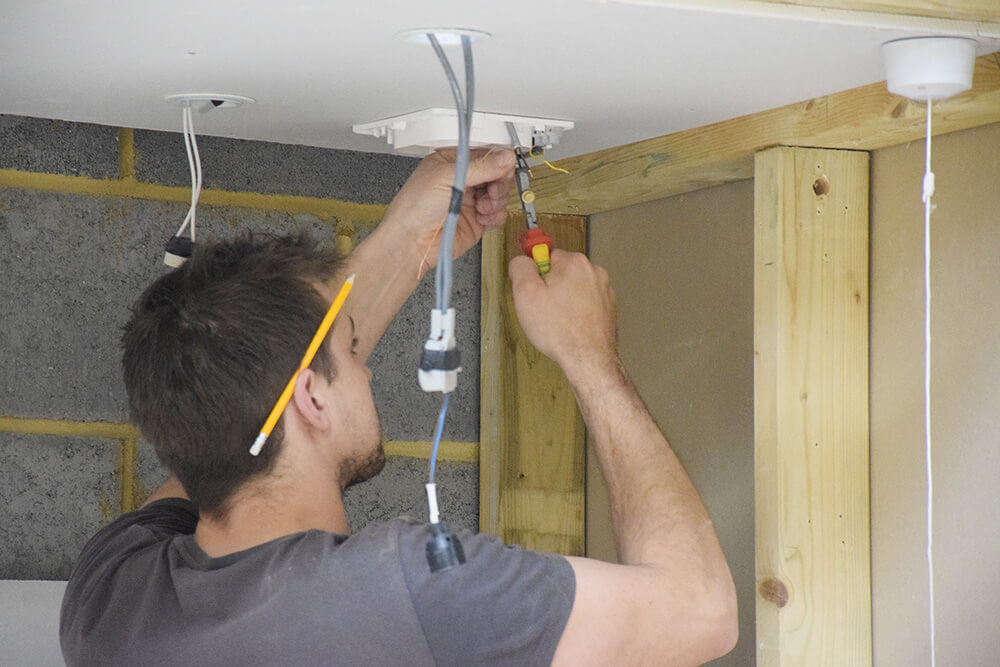What does an electrician do? Skills, responsibilities and job description

Electricians play a crucial role in modern society, ensuring that homes, businesses and public buildings have access to safe and efficient electrical systems. Their work spans installations, maintenance, repairs and upgrades, making them essential in many different settings.
Let’s explore the roles and responsibilities of an electrician in more detail.
What does an electrician do?
Electricians are responsible for installing, maintaining and repairing electrical systems in a wide range of environments. Their work can involve anything from wiring new buildings to diagnosing and repairing faults in existing systems.
Electrical installations
One of the key responsibilities of an electrician is installing electrical systems. This includes setting up wiring, circuit breakers, lighting, and power outlets in homes, businesses and industrial buildings, and following electrical codes and safety regulations to ensure compliance.
Electrical maintenance
Electricians are often responsible for the ongoing maintenance of electrical systems to ensure they function correctly and safely. This might involve checking for wear and tear, replacing outdated components, and making sure the systems meet current safety standards.
Electrical repairs
When electrical systems develop faults, it’s an electrician’s job to diagnose and fix the problem. This could involve anything from replacing a faulty switch to rewiring an entire building. Troubleshooting skills and a robust working knowledge of electrical systems are crucial for this aspect of the job.
Electrical upgrades
As technology advances, electrical systems often need upgrading to improve efficiency and safety. Electricians may be required to modernise electrical panels to support higher energy demands, or install upgraded manufacturing equipment to meet increased output requirements.
Where might an electrician work?
Electricians work in a wide range of environments, from private homes to large construction sites. There are several types of electricians, including domestic, commercial and industrial, each with their own specific duties and areas of expertise.
Residential buildings
Domestic electricians working in residential settings install and maintain wiring, lighting and electrical outlets for domestic clients in houses and flats. They may also fit modern electrical solutions such as smart home systems, energy-efficient lighting and security systems.
Commercial premises
Shops, offices and other commercial buildings require electricians to install and maintain their electrical infrastructure. This includes lighting, ventilation systems and electrical panels, ensuring that businesses operate smoothly and safely.
Industrial units
Industrial settings such as factories, warehouses and manufacturing plants need electricians to install, maintain and repair equipment like motors, generators and control panels. These locations may either hire full-time, on-site electricians for these tasks or bring in contractors for ad-hoc jobs.
Construction sites
Electricians are essential on construction sites to install electrical systems in new buildings. This includes setting up power supplies, installing temporary lighting for the duration of the construction project, and ensuring that all wiring meets the necessary regulations before the building is occupied.
Specialist locations
There are many different specialist environments that require the skills of an electrician, from military bases to hospitals and transport networks. Electricians working in these areas require additional knowledge and qualifications to enable them to handle unique safety challenges and work with specialised equipment.
What skills do electricians need?
There are various hard and soft skills that electricians need to be successful in their roles, including:
– Technical electrical knowledge
– Safety awareness
– Mathematical skills
– Computer and software competency
– Attention to detail
– Problem solving
– Time management
– Customer service
– Honesty and integrity
– Effective communication
Check out our guide to the 10 essential skills for an electrician to explore these points in more detail.
What responsibilities do electricians have?
Electricians take on a wide range of duties, depending on their specialisation and working environment. Common responsibilities for electricians include:
– Testing electrical systems to make sure they’re safe and functional
– Building electrical control panels for commercial and industrial use
– Servicing and repairing electrical components in machinery
– Fitting smart controls for lighting, heating and security systems
– Installing electrical and fibre-optic cabling in homes and businesses
– Responding to emergency call-outs
– Ensuring compliance with electrical codes and safety standards
– Troubleshooting faults and diagnosing electrical issues
– Collaborating with other professionals such as builders and engineers
Thinking about becoming an electrician? Speak to the experts in electrical training
If the varied and rewarding role of an electrician sounds appealing, we’d love to hear from you. Take a look at our available courses or get in touch, and we’ll be happy to support you on your journey to becoming a qualified electrician. Alternatively, learn more about why EC4U is the right choice for your training.
Back to blog



